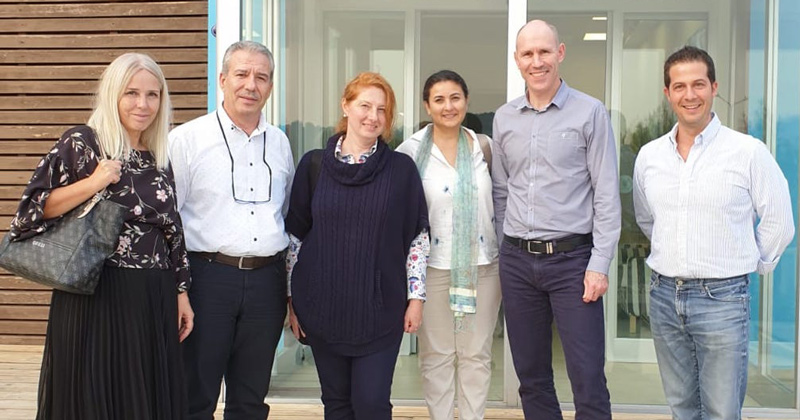


Science diplomacy during COVID-19
Photo courtesy of Patricia Westenbroek September 14, 2020
UD alumna Patricia Westenbroek confronts infectious diseases and public health throughout the Middle East
The world wasn’t ready for the coronavirus (COVID-19). The pandemic turned the world on its head. An international legion of health experts are working to wrangle this enigmatic beast — people like alumna Patricia (Trish) Westenbroek, an alumna of the University of Delaware’s College of Agriculture and Natural Resources. The former animal science major turned her agricultural schooling into a career in One Health, a program that is part of the U.S. Centers for Disease Control and Prevention and strives for holistic thinking about how human health, animal health and the health of our environment are intertwined.
The UD alumna found herself in Afghanistan in 2012, first as an international agricultural development adviser with the U.S. Department of Agriculture and then as a biosecurity engagement program coordinator with the U.S. Department of State. Both roles play into her current role of implementing foreign assistance funds in biosafety and biosecurity. Now working for Health Security Partners, an international nonprofit that builds health security capacity at the local level, Westenbroek focuses on Afghanistan, Iraq and Turkey.
When COVID-19 exploded, she reached out to her extensive health and veterinary network, embarking on a public health campaign. Turkish colleagues requested assistance with getting the word out quickly to their foreign students, especially their more vulnerable refugees.
“I pulled and distributed scientific materials translated into local languages. This builds trust and makes sure everyone understands that this is a global problem; COVID-19 is not something that the Turkish government is doing to them,” said Westenbroek, who earned her bachelor of science degree in Animal Science with a pre-veterinary medicine concentration in 1997.
The nonprofit supports many students in higher education, including Syrian refugees. These individuals pursuing advanced degrees are seen by their local communities as leaders, which builds trust in public health education and outreach.
Having spent the better part of the last decade working in Afghanistan, Westenbroek and her partners laid the foundation to build laboratory capacity for testing of various diseases. When COVID-19 struck, they were able to rapidly switch gears and train a specialized cohort in the Ministry of Agriculture. The years of science diplomacy paid off in the first weeks of the novel coronavirus reaching South Asia.
“The veterinary laboratories actually had equipment and expertise that the Ministry of Public Health did not. So, the Ministry of Agriculture said, ‘We can help you,’” said Westenbroek. “As much as entities like the World Health Organization want to support with resources, sometimes that funding takes a while. We were able to quickly pivot and get the funds to the Ministry of Agriculture. Within a week, they were up to 100 tests per day per lab. The labs had a 99% proficiency testing rate.”
When she’s not working on global pandemics, Westenbroek works on infectious diseases, laboratory capacity building, supporting biosafety practices and science diplomacy. In Turkey, she is developing Syria’s next scientific leaders, so they can safely pursue their education. Westenbroek is also running a first responder program in Iraq, teaching best practices in dealing with biological incidents and pandemics.
“Sometimes it’s just about asking the right questions when working with international colleagues, particularly in Afghanistan,” Westenbroek said. “Then they find their own solution; it is appropriate, meaningful, based in science and it works. You provide mentorship, so you end up with localized solutions.”
If that wasn’t enough, she was recently named an editor on Health Security Partners’ planned book on COVID-19's impact on society, for which it is seeking chapter contributors. The book will cover everything from the economic effect to psychosocial effect of the pandemic.
Westenbroek spent an early part of her career with Cooperative Extension, a nationwide educational network at land-grant universities like UD. Extension agents address public needs through educational outreach to farmers, ranchers, communities, youth and families.
“My Extension career taught me ways of instruction to share knowledge, particularly scientific principles on how to solve different, complicated issues,” said Westenbroek, who covered the Catskills region of upstate New York while at Cornell Cooperative Extension. “The best part about Extension is that you have to make it accessible for everyone — and they mean everyone. That experience has helped me during this COVID-19 response.”
When looking at what to study, Westenbroek looked at both human and animal health programs, ultimately deciding that animal science was most advantageous for her.
“When you are in animal science, you learn more, how diseases work and evolve, in that convergence of the environment, animal and human health,” Westenbroek said. “I firmly believe that as an animal science or entomology student, UD enabled us to understand behavior and non-verbal communications, moreover, than if I were a med student. We can see the subtle changes in our patients that can make a difference in care.”
Westenbroek is grateful to UD for the opportunity to grow and learn. She credits the University in setting her up for her career and in life.
“The College of Agriculture and Natural Resources is the gem of the University of Delaware. It’s a very welcoming and family-oriented type of culture,” said Westenbroek, who minored in chemistry and agricultural economics. “It set me up for lifelong learning; the lessons I learned 20 years ago from all the professors like Drs. Sam, Dohms, Kung, Saylor and Griffiths influence my approach to technology and science diplomacy today.”
Contact Us
Have a UDaily story idea?
Contact us at ocm@udel.edu
Members of the press
Contact us at 302-831-NEWS or visit the Media Relations website

